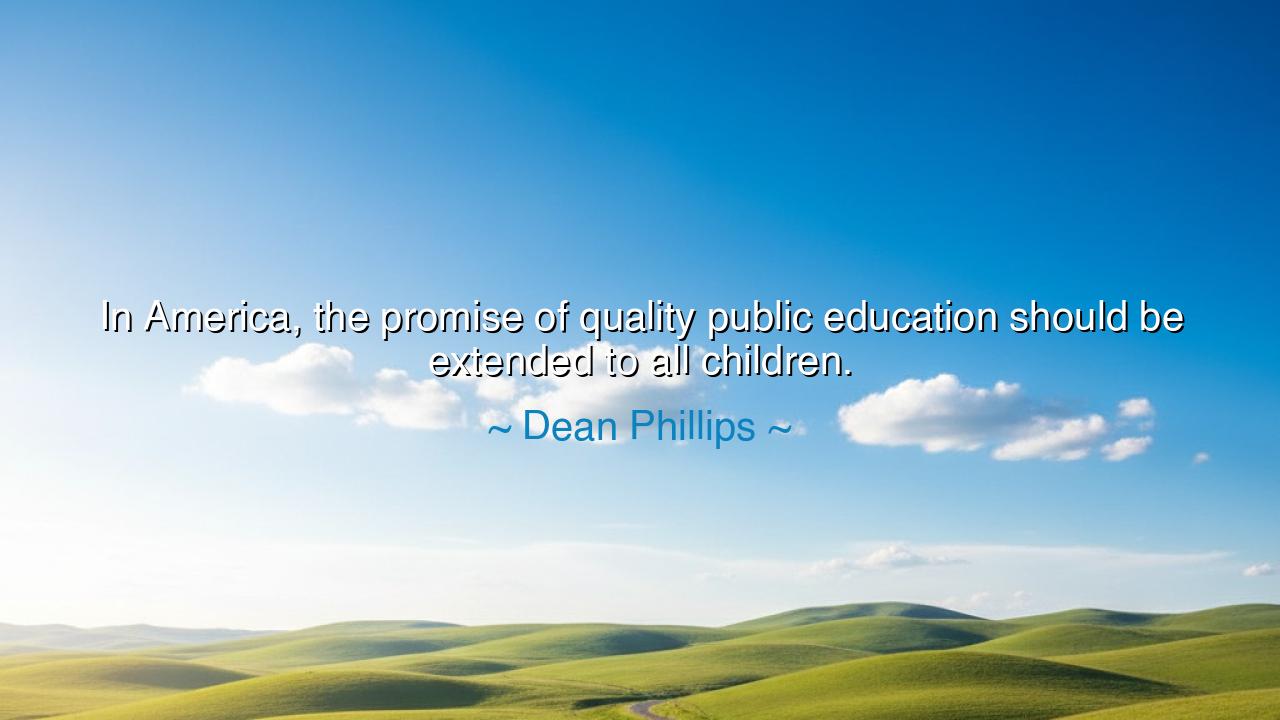
In America, the promise of quality public education should be
In America, the promise of quality public education should be extended to all children.






“In America, the promise of quality public education should be extended to all children.” — Dean Phillips
There are words that do not merely describe policy — they echo the moral heartbeat of a nation. When Dean Phillips, a statesman and servant of the people, spoke these words, he was not addressing a classroom or a committee; he was invoking the oldest promise of democracy — that knowledge belongs to everyone, not just the privileged few. His declaration is simple in form yet profound in truth: that education is not a favor granted, but a right inherited, the foundation upon which freedom itself is built. In these words, one hears the voice of the Republic reminding its children that equality of opportunity begins not in wealth, but in the classroom.
The origin of Phillips’s statement lies in a long and unfinished struggle — the American quest to make education universal and just. From the one-room schoolhouses of the frontier to the grand public universities that dot the land, this nation has always proclaimed that learning is the key to liberty. Yet, generation after generation, the gap between this promise and reality has endured. Too many children, born in the wrong zip code or under the weight of poverty, still stand outside the gates of that promise. It was against this enduring injustice that Phillips raised his voice, urging a renewal of that sacred covenant — that every child, no matter their color, wealth, or circumstance, must be given access to quality public education.
In the days of the founding fathers, the idea of education for all was revolutionary. Men like Thomas Jefferson and Benjamin Franklin saw learning not as a privilege for the elite, but as the guardian of freedom. Jefferson once wrote, “An educated citizenry is a vital requisite for our survival as a free people.” He understood what Phillips now echoes — that democracy cannot survive on ignorance. The uneducated citizen is easily deceived, easily silenced. But the child who learns to read, to reason, and to dream becomes a defender of liberty itself. Thus, to deny any child a fair education is not merely to fail them — it is to wound the very heart of the nation.
There was a time, not long ago, when this truth was tested in the fires of history. In 1954, the Supreme Court’s decision in Brown v. Board of Education shattered the lie of “separate but equal.” It declared that segregated schools were inherently unjust, that to deny a child equality in learning was to deny them equality in life. The courage of those who walked into integrated classrooms — young students like Ruby Bridges, who faced hatred armed only with innocence — reminds us that education has always been the battlefield of equality. Dean Phillips’s words are born from that same lineage of struggle. He speaks not of reform alone, but of redemption — the fulfillment of a promise made long ago and too long deferred.
For education is not only about the mind — it is about dignity. The child who is given a quality education learns not only arithmetic and grammar, but the sacred truth that they matter. In every lesson taught with care, in every teacher who believes in a struggling student, a seed of confidence is planted. And when those seeds bloom, the whole nation rises. But when education is denied, when schools crumble, and teachers are silenced by neglect, the promise of democracy itself begins to wither. As Phillips reminds us, the promise of America must not be partial — it must extend to every child, for the child is the future clothed in innocence.
In the style of the ancients, one might say that education is the lamp of civilization — it must be kept burning, and its light must fall on all. The great philosophers of Greece once taught their students beneath the open sky, believing that wisdom was the inheritance of all who sought it. They would have understood Phillips well, for they too saw the danger of knowledge hoarded by the few. To withhold education is to dim the light of reason itself; to share it freely is to keep the fire of progress alive.
Thus, the lesson of this quote reaches far beyond policy or politics. It calls upon every teacher, parent, and citizen to become a steward of the nation’s promise. Support your schools. Defend your teachers. Lift up the children who struggle. Demand that every classroom, whether in the richest city or the poorest town, be a sanctuary of opportunity. For if one child is left behind, then the whole nation walks with a limp.
And so, let this truth be carried like a torch through the ages: education is the great equalizer, the builder of character, the mother of freedom. Dean Phillips’s words are not merely a plea — they are a prophecy. For when the day comes that every American child learns under the same sun, with the same hope and the same tools to shape their destiny, then — and only then — shall the promise of America be fully realized, and the light of her ideals shine undimmed across generations.






AAdministratorAdministrator
Welcome, honored guests. Please leave a comment, we will respond soon